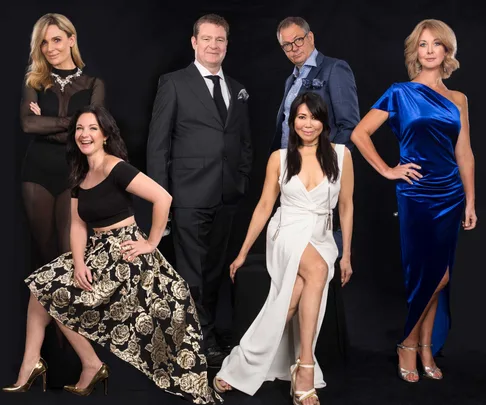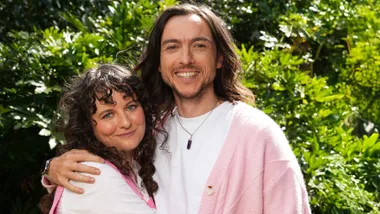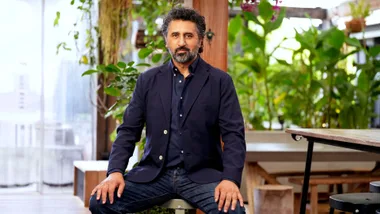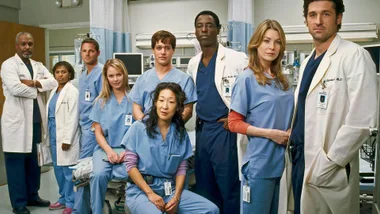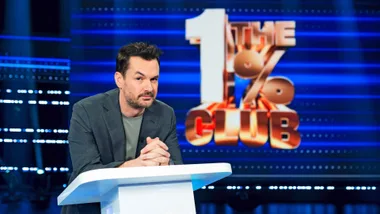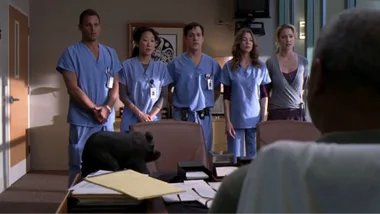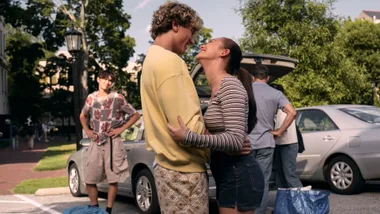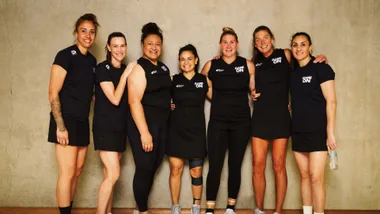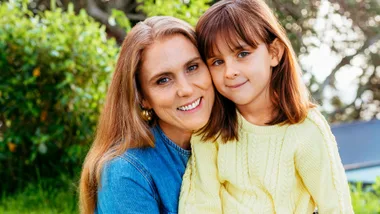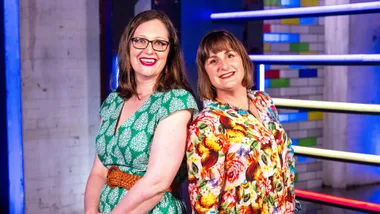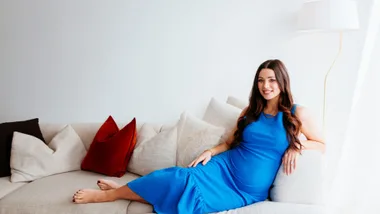It’s 25 years since Shortland Street’s first title sequence resonated through living rooms around New Zealand and viewers first met a string of core characters who would become regular 7pm companions.
The early years of the show set in a fictional hospital came with risk and expectation – would we like seeing versions of ourselves five nights a week on screen? Would we like hearing our accents?
But Shortland Street thrived and endured, and 25 years later is a significant part of New Zealand’s social landscape – giving viewers familiar entertainment at teatime, while reflecting our stories back to us and providing a training ground for some of the country’s greatest talent.
To celebrate the milestone anniversary, The Australian Women’s Weekly brought together six core cast members from those early years – Claire Chitham, Theresa Healey, Danielle Cormack, John Leigh, Lynette Forday and Peter Elliott – to reminisce about the debut years of New Zealand’s longest running soap.
We share their reflections on the show’s fortitude and how their time in fictional Ferndale has affected their lives.
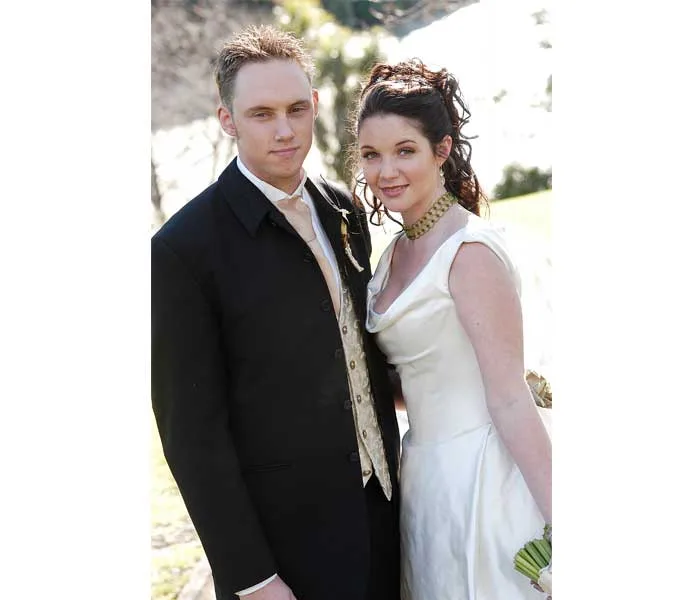
Claire Chitham as Waverley on her wedding day to Nick, played by Karl Burnett.
Claire Chitham first appeared as Waverley Wilson in 1994. It was meant to be a five-week gig but the bubbly, meddling Waverley became a popular character and stayed on the show for six months. In 1998 she was written back in to the show and spent a further six years there.
Waverley ran the coffee shop, then bar, and married Nick (Karl Burnett), with whom she had a daughter. The popular couple return to Ferndale again this month to celebrate the 25th anniversary.
“Waverley was Rachel McKenna’s [Angela Bloomfield] cousin, a country bumpkin who idolised Kirsty Knight [Angela Dotchin] and went a little ‘single white female’ on her, chopped off all her hair and went blonde. I still remember sitting at the hairdresser for eight hours while they tried to dye it. This was 1994 – the hair technology was different then!
Waverley was in love with Stuart [Martin Henderson] but decided she should sleep with Nick to get practice for Stuart – as you do! And that’s when the Waverley/Nick combo kicked off. The romance scenes were definitely awkward but Waverley and Nick really only had pecks. I don’t think anyone needed to see Waverley do anything sexual.
When people do recognise me and want to talk to me about the show they get very warm and glowy. Someone actually walked up to me in a store once and told me they had named their daughter Waverley!
It is really nice for me that people do have fond memories of her because if you took someone back they would remember she was actually one of the most frustrating characters – she would always put her foot in her mouth and if you hoped a romance was going in a certain direction you could guarantee Waverley would come in to mess it up!
She did a lot of talking and I got very good at learning lines. I would sit in the make-up chair in the morning and learn 15 scenes at once and we would shoot them all in a row.
When I turned up as a 16-year-old I remember being completely in awe of the people I was about to see – Temuera Morrison [Dr Ropata], Angela Dotchin, Craig Parker [Guy Warner] and Theresa Healey [Carmen Roberts]. George Henare played my grandfather and we did training with Raymond Hawthorne.
I was working with people who have become some of New Zealand’s best actors but also the elder statesman of our theatrical generation. Since then I have watched crew members who started off as trainees on that show become the best practitioners in our country.
I never thought there would be any recognition for fame from it because my role was supposed to be so little.
I still remember the first time I was recognised at a food court – it was very strange and confronting. I remember nodding and smiling and not knowing what to say really.
The Shortland Street building works in a very different way to any other TV show, it always has – it was a leader of its time around the world because of its speed. Most shows film a whole scene, then the camera moves position and they shoot that whole scene again, but Shortland Street has three cameras on wheels and a control room that cuts between the cameras as they are recording.
I think there were probably lots of teething problems but when I returned [onscreen] in 1998, it felt like a show that was on its feet and it was a bit more like a factory – there were cogs in the wheel it had to turn and everybody knew their roles.
The storyliners became famous for their ability to almost second-guess what was going on in society. Like the nurses’ strike. They had written and shot a storyline about nurses at Shortland Street Hospital going on strike and literally as the show went to air the Auckland Hospital nurses went on a massive strike.
That is not the first and only time that happened. It really is the only place we have continued to see ourselves put on screen – they are our stories and the writers work really hard to keep them relevant.
It is all the little things that stand out – the funny things. It’s terrible, but I smoked in 1994 and then you could smoke in your dressing rooms! So I would have all these scenes in a row and I would go out to shoot one, then go back to change my costume, light a ciggy, smoke two puffs, go back out, then come back and light the same ciggie – it was disgusting! You could smoke in all the rooms except the make-up room and the studio.
I left in 2004 and I didn’t think I’d be hired on New Zealand TV for a while, so I became a Pilates teacher, but gratefully I did get hired again. I did a couple of TV shows and a play that year and then Outrageous Fortune came along the following year.
Coming back this time, I really wanted to honour the memory of Nick and Waverley. I worked hard to make sure we were giving the audience what they loved about those characters.
The biggest thing for me when I got those scripts was that they were funny and I think the essence of those characters was on the page. It was cool to be asked because I guess that means those characters were popular enough that people want to see them again, and that’s a really nice feeling.”
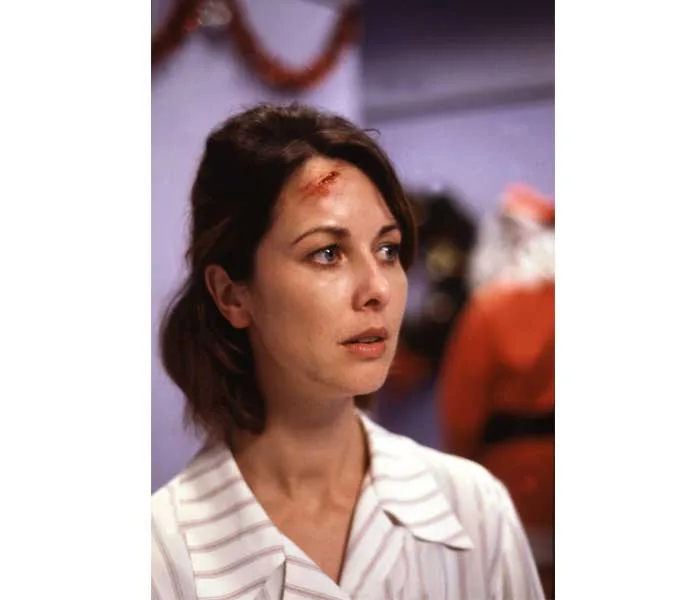
Injured Carmen shortly before the character died.
Theresa Healey played Nurse Carmen Roberts from 1993-1995, a well-loved character who had baby Tuesday with her beloved partner Guy Warner. She died of a brain aneurysm after three years on the show and the death went down in Shortland Street history as one of its most shocking. Theresa most recently starred in Agent Anna and Filthy Rich.
“When Shortland Street started, Craig Parker and I were performing in Macbeth at the Aotea Centre in Auckland. They had a TV in the green room and we would get dressed each night, do our warm-up, then sneak off and watch Shortland Street.
It would end and as we were about to go on stage we would say to each other, ‘We need to be on that show.’ Fast-forward two months and we both were.
It had been going for about six months when we arrived on set; it had definitely hit its straps with the public. Going to the supermarket was never the same again.
Being onscreen five days a week meant the level of recognition was intense, and the public loved having local actors they recognised as TV stars. It was a novelty for about a week [for the actors] then it was like, ‘How do we cope with this?’ None of us had experienced being ‘famous’ before.
We stuck together for support and were working incredibly long hours and doing publicity gigs every weekend – school fairs, graduations, petrol station openings!
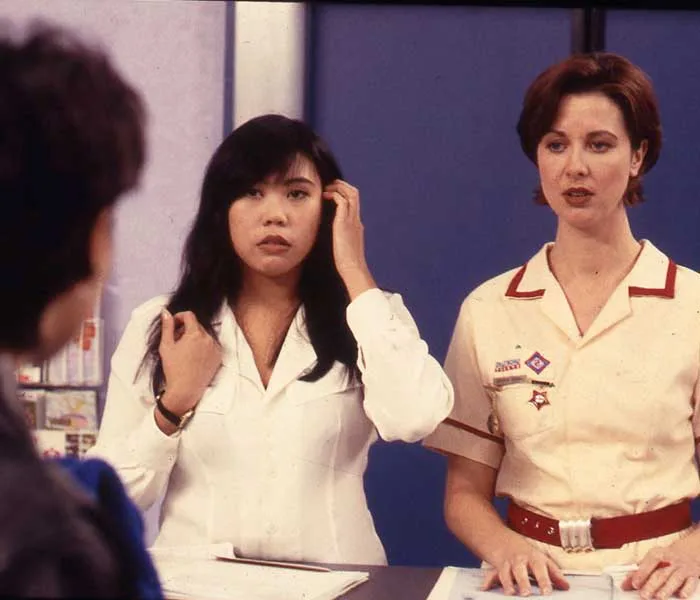
Lynette Forday (Grace Kwan) with Theresa Healey.
Luckily most of the actors my age and older had come from years of working in the theatre and we knew how to work hard and not let the ‘fame’ change us in any way. We knew we could be back in the dole queue any minute and just revelled in having a full-time job for 52 weeks of the year. It was unheard of in our industry.
My first nurse’s uniform was a hand-me-down from Jackie Manu [played by Nancy Brunning]. I was five foot eight and she was five foot two, so it never fitted right.
I loved Friday mornings – they were bed scenes on the Toroa (Carmen and Guy’s houseboat). I’d come to work, get back in my pyjamas and get into bed with the funniest man in the world.
I only left because no one had talked to me about staying. My contract was to end on a certain date and after two-and-a-half years I had had enough so I booked a trip overseas.
When the producers found out they went, ‘NOOO you can’t go,’ and I said, ‘Whoops, I have organised and paid for it,’ so they decided to kill her off on Christmas Eve. It was strange to be told your character will die, but it was the best thing for me; it meant I would not be tempted to come back. I still meet people who say, ‘I stopped watching after you died.’
My funeral day was weird – I stayed at the studio while everyone else went to the church. When they arrived back we all left together to go to a garden party at Government House where we had been invited to meet the Queen… the day just kept getting weirder!
Craig was telling funny sad stories of crying over my coffin with snot coming out and Dame Cath Tizard introduced each of our characters with a brief breakdown to the Queen. Cath was a real fan. The Queen had such beautiful skin.
When we started there were very few other TV drama shows being made so we got the cream of the crop of writers, and this continues today.
It was never merely a soap – they love the characters and care about the stories, and this shows.
They have more than one finger on the pulse of what’s happening in our world and they are not afraid to be controversial and break new ground. Also our crews are the best in the world. It wouldn’t be so successful without them!
I would have carried on being an actor with or without Shortland Street but it made me a household name for a while and people still recognise me from it. That can be a bit annoying considering I have done so much other work, but I loved working on it and cannot deny that having that profile has opened doors. I am still so proud of the show and the great work everyone does on it. Long may it last.”
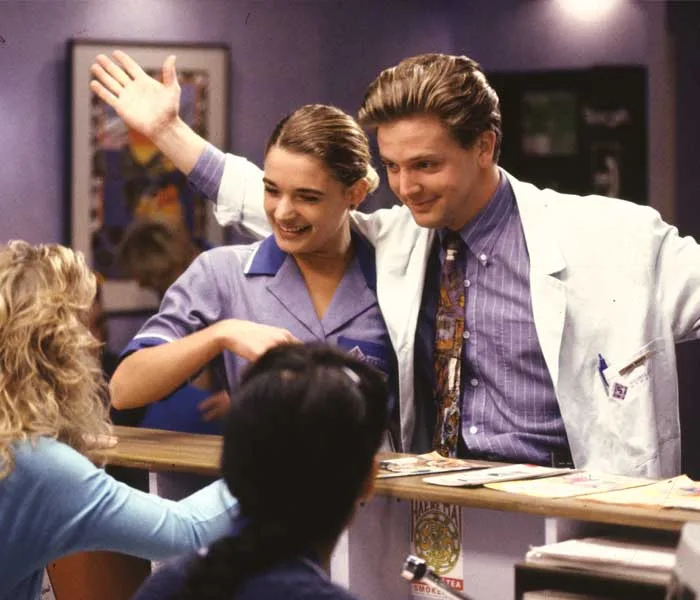
Danielle Cormack and Michael Galvin.
Danielle Cormack played Alison Raynor from Shortland Street’s inception in 1992 until 1993. Alison was a shy country girl who was the object of bad boy Chris Warner’s (Michael Galvin) affections. Danielle left Shortland Street after a year on the show to pursue a successful career abroad and is best known for her award-winning lead role in hard-hitting drama Wentworth.
“We were filming for quite some time before Shortland Street was first released, and so it was with great anticipation that we waited to see how it would be received. Back then there were only two or three TV stations so there was a great expectation around our show.
With great expectation comes great judgement as well, and I think people were pretty quick to have an opinion about the show. There was a huge heart for it, though, and people bonded with it quite quickly.
That first year left an indelible etch on people memories. Over time there have been lots of characters, but initially there really only was that core group. I met someone the other day whose name was Raynor, named after Alison.
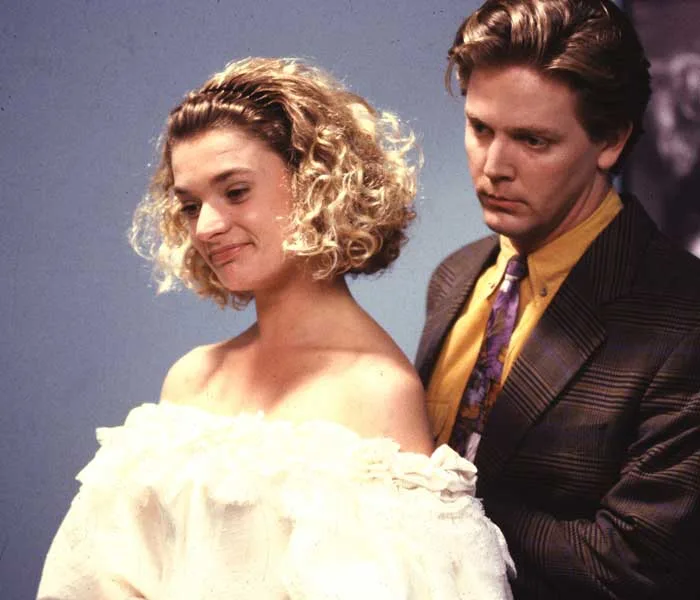
Alison and Chris’ romance made for great drama.
Alison carried two very strong relationships – one with her flatmates in the nurse’s house and the other with Chris Warner. The romantic relationships are always of great interest to people in a soap and because Chris was a bit of a tyrant and Alison was at that time reasonably virtuous, it made for great drama.
There was a huge public concern for Alison’s emotional welfare – I could recount at least a dozen times when people would take it upon themselves to counsel me in the supermarket about leaving Chris Warner.
Back then it was really analogue and the big old cameras looked like daleks. At that stage they were taping over second-hand Gloss and Country Calendar tapes, so if there was a drop-out someone would come down from the editing room and say, ‘We have to go again.’
Looking back, I go, ‘Well done on them for casting right off a diverse cast’ – something that reflected our true community – and I feel like that is something they have remained consistent with. Caterina De Nave [Shortland Street’s producer] made a point of doing that.
The memory I will always cherish was our leaving present for Caterina. After a day shooting, we snuck in with the crew and shot an R18 version – it was late-night Shortland Street and it was my favourite thing in the world! We tarnished that set and we put a whole new spin on all of those characters!
Kirsty Knight gave birth on the reception desk, Alison Raynor was drunk the whole time and Dr Ropata was stomping around in Guatemalan Army gear. For years it was locked in a vault because they were so petrified it would get out to the public – it would break the internet!
WATCH: Shortland Street stars share their advice for their 2-year-old selves. Story continues after the video.
It’s the silly little things that stand out, the things that make your day pass while you wait for your scene. There was this little closet beside the AD’s [assistant director’s] desk and Andrew Binns [Nurse Steve Mills] and I used to hide in there and jump out and scare them. It was so infantile but it was so much fun.
I remember Tem was terrible at learning his lines and every time you picked up a file on the reception desk it would have his lines in them! I am sure it is still the same; every medical folder you open has someone’s script in there.
Shortland Street was way ahead of its time. It keeps pushing the social, political and societal boundaries that can keep a lot of those shows in a certain place. We have a transgender storyline now, yet Neighbours has only recently introduced its first aboriginal character.
I only have the fondest of memories of Shortland Street and an undeniable respect for it lasting 25 years. I never felt like I didn’t want to be there, I just felt I had learnt what I could on the show and the character had come to its end.
There is always someone who comes out of the woodwork and wants to recollect the old days of Alison Raynor. I went through a period where I was profoundly annoyed by that and I wanted to be recognised for other work, but now I am really proud of it and I don’t mind it at all.”
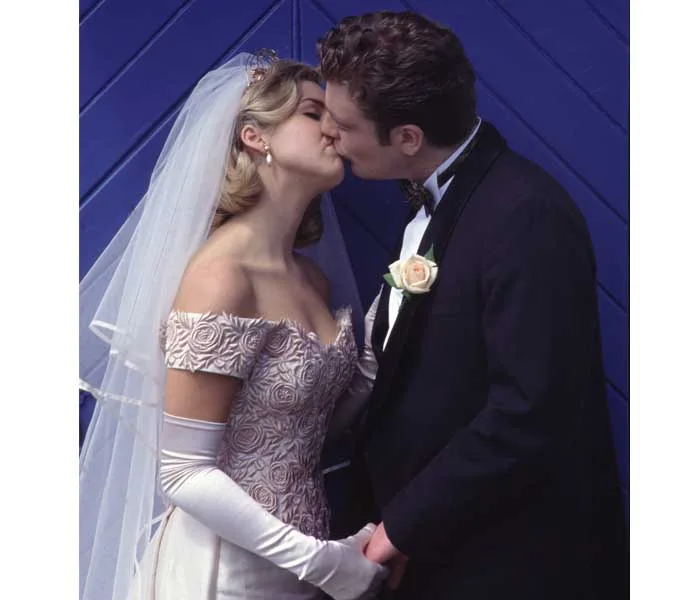
Lionel and his bride Kirsty.
John Leigh played the clumsy Lionel Skeggins, who first appeared briefly in 1993 and returned in 1994 and took over the hospital coffee shop contract. He became as well known for his colourful shirts as for his unexpected romance with the beautiful Kirsty Knight. Lionel’s final episode was in 1999. John starred in Outrageous Fortune as Sparky and most recently on 800 Words.
“There wasn’t much New Zealand television being made at the time and so we were lucky because we had the best people writing and working with us – it was before Hercules and Xena started and before shows like Outrageous Fortune. All of those were possible because of Shortland Street – just spending time in front of a camera as an actor was brilliant.
Of course many of those people have gone on to do well internationally – Martin Henderson, Tem Morrison, and Marton Csokas [Dr Leonard Dodds]. The culture was pretty tight – I think we were all pretty fond of each other.
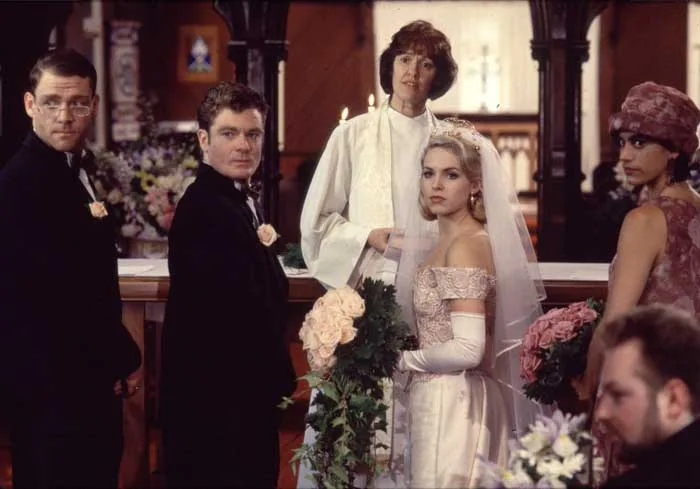
Kirsty and Lionel’s wedding was the 1994 season finale cliffhanger, with the service interrupted by Kirsty’s former love, Stuart.
My advice to myself if I could go back would be: ‘Expect the unexpected – you will get famous and we don’t earn enough money in this country to shield yourself from that.’
I think because it was our only New Zealand show on at the time it was pushed in more directions than a soap normally would be. They were at the forefront breaking ground – they had Indian families, Maori families and they did quite a bit in Te Reo for a while too.
Kieren Hutchison [Jonathon McKenna] and Karl Urban [paramedic Jamie Forrest] did one of the first gay kisses on New Zealand television, which doesn’t sound like a big deal now but it was then. Now the show has a transgender storyline – they are still breaking ground.
It is difficult afterwards to get work because you are so recognisable – but I was rather lucky that a lot of American shows started coming down here, so I was able to do bits on those and survive on that. Shortland Street got me on telly – I hadn’t done that before and it led to other things.”
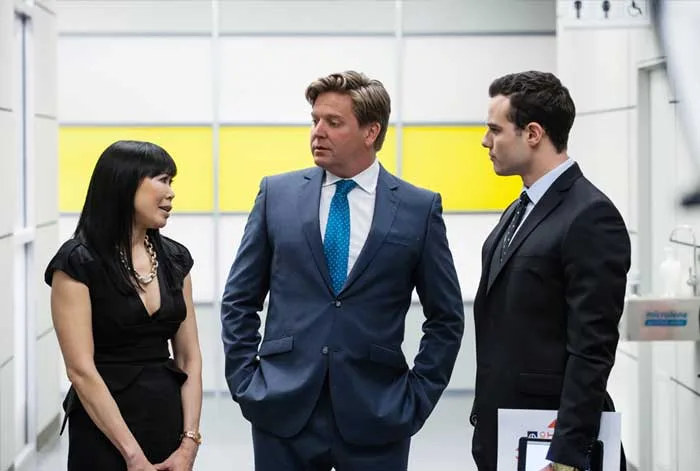
Lynette Forday credits Shortland Street with having strong female characters.
Lynette Forday played Grace Kwan from 1994 to 1997, a hard-working, naturally flirtatious doctor who had a number of romances, including a short-lived engagement to Lionel Skeggins.
Grace left Ferndale in 1997 to pursue a job in an Australian hospital but returned in 2013 and made a plan with Chris Warner to have a baby, with no strings attached. Grace left Ferndale and gave birth to her daughter in Fiji. Chris tracked Grace down in 2014 and she returned to the show for a guest role. Lynette has recently appeared on 800 Words.
“After all these decades people still say, ‘Oh my God, Shortland Street.’ It is a compliment but you also think, ‘Wow!’
As a Shortland Street actor, you are recognised in the street and of course because you are in people’s living rooms every single night, people feel like they know you. Even though it was really embarrassing to be yelled at in the street, the public were lovely, they liked us.
I was really shy and introverted when I started, but the wonderful thing about the public constantly coming up to talk to me was it drew me out of my shell. I am still shy, but I know how to talk to people now.
The fast turnaround makes it really hard work because you are constantly trying to focus on learning your lines. You work all day, then go home and learn lines, then come back early the next morning into make-up and try to remember them – but spending so much time in front of the camera as an actor means you learn so much, so quickly. We were lucky.
It was so fast. I remember Lionel proposing to Grace on a boat – we were lying back and it was pouring with rain and I had to say a line like, ‘On a beautiful day like today…’ and you could hear the rain pelting down! If you were shooting something like Mad Men they would say, ‘Let’s just stop until it’s a beautiful day,’ but we didn’t have time.
Shortland Street has stayed relevant because it reflects New Zealand. The female characters were so strong, and imagine having an Asian onscreen in 1994! I wasn’t playing someone who couldn’t speak English, I was just playing a person, a surgeon.
You got lots of fan mail in those days and young girls were writing in and saying, ‘It is nice to see someone like me.’ It really made me feel good that it made a tiny difference in the world by making people feel comfortable, because when I grew up there was no one like me.
We struggle I think, in New Zealand, getting different coloured faces on screen, particularly Asians; I think we were progressive back then. We were doing really well.”
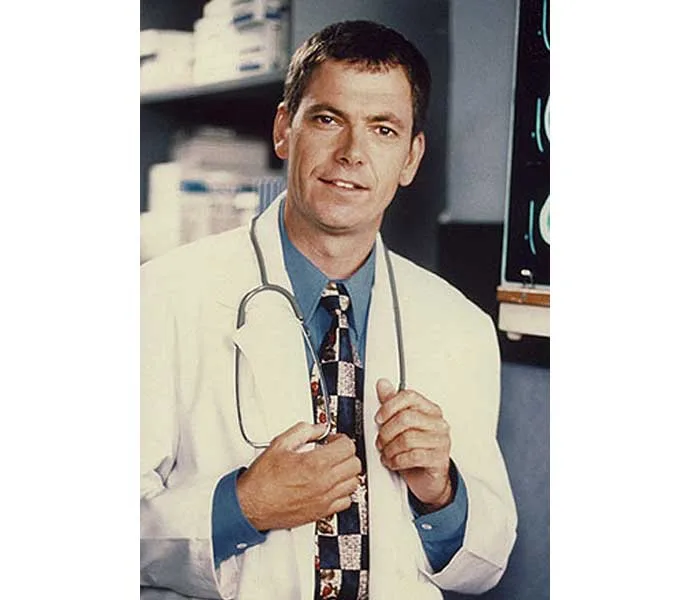
Peter Elliott as Dr David Kearney
Peter Elliott arrived as Dr David Kearney, the clinic CEO, in 1996. He had an on-again, off-again relationship with Nurse Ellen Crozier (Robyn Malcolm). The couple married and had baby Rose, who died from cot death. When David went blind as the result of a rare illness in 1999, he and Ellen moved to Hawke’s Bay, seeing the end to both characters’ roles in the show. Peter now stars in 800 Words.
“Shortland Street changed the public’s mindset about listening to our accent – I think that is the greatest thing it ever did. We got used to hearing and seeing ourselves and since then shows like 800 Words are finding a really happy audience.
It is a sausage machine – you are taking lines in and giving lines out and it is so fast. You had to learn to care and also not to care, because if you cared too much about your character you went insane, but if you didn’t care about your character it showed onscreen – so you had to be able to find a happy balance.
Often David’s office scenes would be Friday afternoon, and you would do 16 scenes at once. Things went wrong on an hourly basis. Lionel would come in and the tea towel would attach itself to the trolley and muffins would fly everywhere. I remember doing a scene with Marjorie Brasch [Elizabeth McRae] at the reception desk.
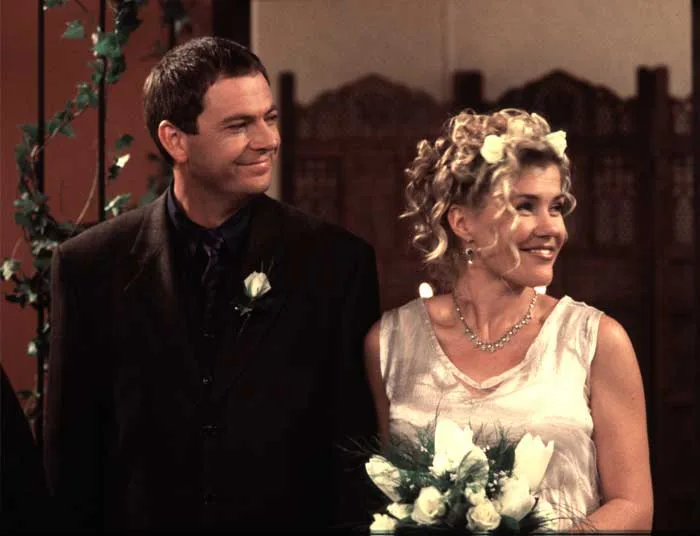
Joy and tragedy were scripted for Peter Elliott’s and Robyn Malcolm’s characters.
I had to hand her something from my pocket but there wasn’t anything in there and so I went, ‘Here, read this’ and gave her the lining out of my pocket. We didn’t think anything of it but next thing I got a cheque for £189 from the UK, where it had been on a bloopers tape – I made more from that bloopers tape than I did from the episode.
I think the show has stayed relevant because of the storylines – and because it is a major training ground for writers and crew, so it gets a lot of new blood coming in.
It is one thing that does stay stable in our lives and there is bugger all of that – even the news has changed format. There is still a certain stability about it that we look forward to, it has momentum to it but they are not messing with it – it started off in the right way, it had social relevance and it’s continued at that level.
Lucy, my daughter, did her stint on it for four years [as Dayna] and she learnt a phenomenal amount about her craft. I learnt in the theatre and brought that experience to the show, but Lucy had her apprenticeship onscreen, and her feedback wasn’t a live audience at night, it was social media, which can be as cruel as buggery because it is faceless.
She learnt the hard way to have a bit of a skin but also to deliver the best work she possibly could because the best way of dealing with that feedback is to just do better work. Shortland Street gave me a stable income when I had kids, which is beyond rare as an actor – it is like winning Lotto.”
